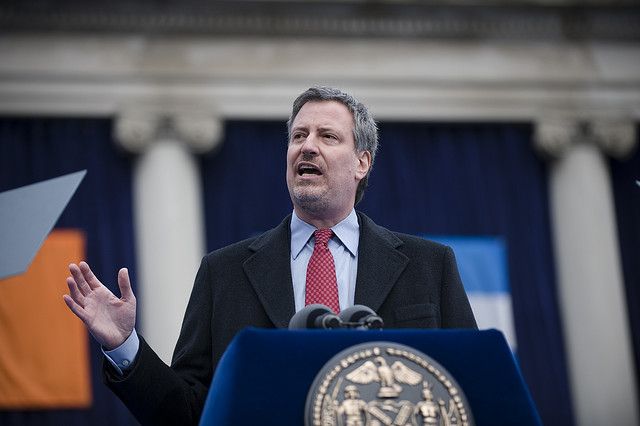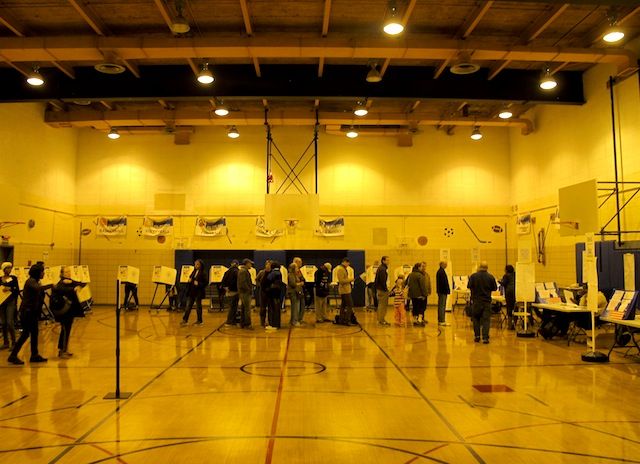As expected, Bill de Blasio is the 109th mayor of New York City. The sitting public advocate and former councilmember won in a landslide victory over Republican challenger and former Metropolitan Transit Authority chairman Joe Lhota. Early exit polls last night showed de Blasio taking about 72 percent of the vote and dominating all demographics.
De Blasio won the Democratic nomination in September with a progressive agenda focused on boosting the city’s eroding middle class and fighting income inequality. His “Tale of Two Cities” message carried over into the general election, though even those who voted for him remain skeptical of his dreams of a more equal New York.
“I don’t think it’s possible,” Amanda Lisle, a 37-year-old Brooklyn resident, said outside polling station 282 in de Blasio’s old Park Slope stomping grounds. “But I definitely think it’s something to work towards.”
Chuck Dorr, a 60-year-old who has lived in Park Slope for 28 years, feels the same way. “His promises are really good and I can see where the common people say, ‘yes, that’s me,‘” Dorr said of de Blasio. “I just think his hands are tied like all politicians, and I think he’s going to still be in the pocket of big money and his promises are going to prove not as successful as he hoped.”

Credit: Bill de Blasio
It’s not just ordinary voters who remain apprehensive of de Blasio’s noble vision. The new mayor is a staunch supporter of mandatory inclusionary zoning and has said his affordable housing plan will create 50,000 new units over the next decade. But some experts remain skeptical. “I didn’t think it has been a game changer everywhere, and I don’t think it is a game changer here,” Vicki Been, director of the Furman Center for Real Estate and Urban Policy at New York University and an inclusionary zoning expert, told the Wall Street Journal last month.
I wrote about the new mayor’s development platform about a week before the primary, questioning whether de Blasio’s good intentions could translate to City Hall. Brad Lander, who succeeded de Blasio as councilmember when the latter became public advocate, expressed support to me at the time, saying, “I think he has a big-picture equitable development vision.” But even some of the mayor-elect’s supporters worry about the feasibility of translating an equitable utopia to the streets of New York.
Lhota had a tall task, and it was de Blasio’s race to lose. That irked Dorr, who felt the ballot was lacking both desirable candidates and healthy competition. “It was sad that there was no other competition to even play against,” he said. “I thought that the Republican candidate was weak. I couldn’t believe that all we had was the choice of de Blasio.”
Still, those I talked to outside Precinct 282 — those who agreed to be quoted and those who just chatted in passing — are excited to see what the next mayor brings. “Bloomberg did a better job than I expected,” Lisle said. “But I think it’s time for a change.”
It was Bloomberg’s cronyism with the police department that wore thin on one Brooklyn resident. “Bloomberg seemed to be in concert with Ray Kelly,” said Greg, who refused to give his last name. “The main thing [with de Blasio] is to stop the police state, which is already here. Or to slow it down.” (No, it isn’t lost on me that the one voter I spoke with who refused to disclose his full name is worried about a police state.)
The post mortems on Bloomberg have been coming down the pipeline since late summer, and now de Blasio will have to answer hard and fast questions as he nears his swearing-in ceremony this January. Will he be able to implement mandatory inclusionary zoning across the city, or will he relent when big-ticket developers start whispering from back rooms? Can he inject some life back into the lower and middle class? Will he make New York a more equal city?
He’ll have four years to give it a shot. But on Election Day, even those who voted for him think his good intentions will fall victim to Politics As Usual.
The Equity Factor is made possible with the support of the Surdna Foundation.

Bill Bradley is a writer and reporter living in Brooklyn. His work has appeared in Deadspin, GQ, and Vanity Fair, among others.

















